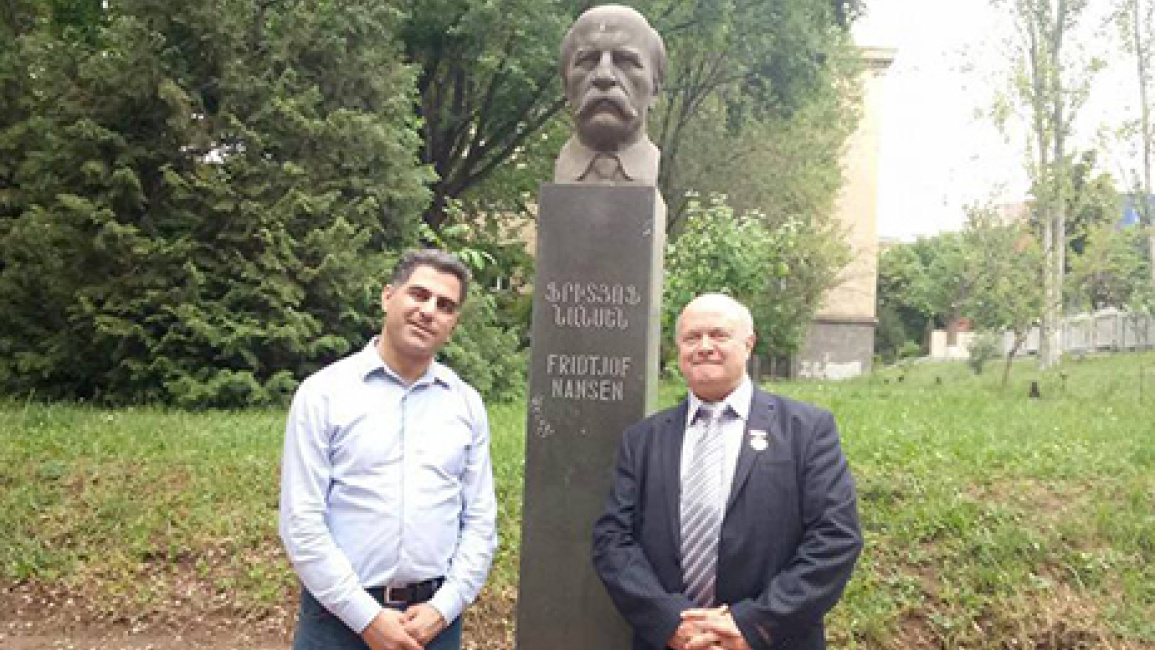- Main
- Node
- "ARMENIAN STUDENTS ARE VERY STRUCTURED, THEY HAVE A LOT OF RESPECT FOR THE TEACHERS". PROFESSOR OF THE UNIVERSITY OF BERGEN, NORWAY NILS-KARE BIRKELAND
November 20, 2019 | 17:09
Science
"ARMENIAN STUDENTS ARE VERY STRUCTURED, THEY HAVE A LOT OF RESPECT FOR THE TEACHERS". PROFESSOR OF THE UNIVERSITY OF BERGEN, NORWAY NILS-KARE BIRKELAND
Professor of the University of Bergen, Norway Nils-Kare Birkeland delivered a lecture at YSU about extremophilic bacteria.

We had an Interview with him and talked about educational system, students and Fridtjof Nansen.
-What can you tell us about your experience in Armenia?
I didn’t know much about Armenia before. I knew that it was former soviet country. But now, when I have this opportunity to visit Armenia every year, I didn’t even remember how many time I was here already, I have learned a lot about Armenia, Of course my collages helps me a lot. Now I know a lot of interesting things about Armenian History and culture.
I think now I know how things are working here in Armenia.
Armenians are very hospitable, I also want my friends to come and to visit Armenia.
What considered Arminian history , I can say about Armenian genocide. It is actually not well-known in the west of Europe. It was interesting to learn about it.
I also have enough time to learn more about Armenia educational system.
I can say that Armenian students have theoretical knowledge, but when it comes to the practical skills , they need more help when they start to use their theoretical knowledge in practice.
-And what can you say about it?
I can say, that at least it is different, not strange, but different from what I am used to.
-As we are talking about differences, what are main differences between Armenian and Norwegian students.
I have hosted many Armenian students in Norway , so I can say that they are very motivated to work. In my university they get their own key cards and can freely enter buildings and laboratories if they like to work also after work hours and in weekends, but this raises also some safety issues if they use dangerous chemicals without supervision as we have more strict HSE (health safety and environment) regulations. Sometimes we have problems with language, but it is not a big problem.
In Norway PhD students are well funded with good scholarships so they can focus all the time on their studies without having to work outside the university to make a living. I was surprised to learn that here most have to work in addition to being PhD students, which makes life very hard and slows the academic progress.
Speaking about differences between Armenian and Norway students, I can say that Armenian students are very structured, they have a lot of respect for the teachers. It is something that we do not often see in Norway.
-Can you tell us about your subject?
This program is a higher educational network program for PHD and Master students. The main aim is to improve and modernize higher education, increase internationalization of universities, provide students with international experience, and contribute to education of the next generation of university teachers. We also want to make sustainable long-lasting bonds between universities in Armenia and Norway as well as between Armenia and other countries in this region.
We have opportunity to make research in extreme environment in Armenia, e.g. hot springs and saline or acidic areas, to know what kind of bacteria are leaving there and if they can be of any benefit for industrial or agricultural purposes.
-Something to add…
I have also learned that in Armenia there is a lot of unnecessary bureaucracy, making it difficult for my colleagues here to work smoothly. I believe this is a remnant from the Soviet time, as I can find similar systems in other former Soviet countries.
I didn’t know much about what Fridtjof Nansen have done for Armenian people. I was very impressed, and also proud about the way Armenians honor this historical person.

